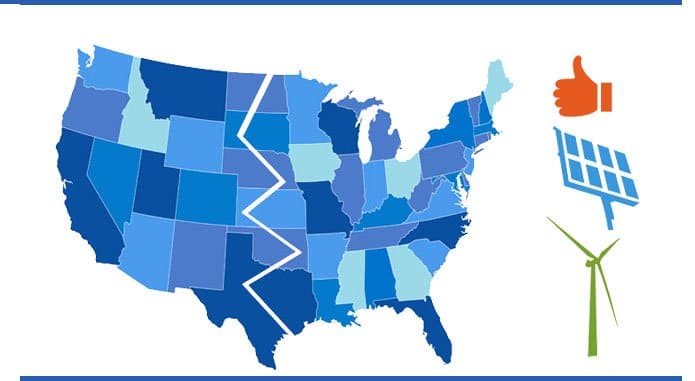The Climate Center (CCP) has operated for years on the premise that local control of energy resources is key to reducing greenhouse gas emissions in the United States. This is specifically because of the uncertainty of action at the federal level as the political tables turn at election times. CCP has coupled this tactic with a focus on clean energy messaging. The current politics of the American presidential election and a new PEW study have illustrated why this approach is key to success.
The PEW study on American attitudes toward climate change reveals a deep divide, mostly down party lines. Just over a third of Americans say they care a great deal about climate change. Among them, 72 percent are Democrats and 24 percent are Republicans. Both numbers include independents who say they generally lean toward one party. Furthermore, nearly seven of 10 Democrats believe climate change is mainly a result of human activity, while fewer than a quarter of Republicans believe that.
So how do these attitudes fit into the larger global picture? A paper recently published in the journal Politics and Policy by Sondre Båtstrand at the University of Bergen in Norway compared the climate positions of conservative political parties around the world. Båtstrand examined the platforms or manifestos of the conservative parties from the U.S., UK, Norway, Sweden, Spain, Canada, New Zealand, Australia, and Germany. He found that the U.S. Republican Party stands alone in its rejection of the need to tackle climate change. Båtstrand argues that a combination of fossil fuel industry influence and record levels of political polarization may explain why.
The unique position of conservative America is especially evident when looking at the global response to the current U.S. election. A number of countries acted quickly to join the Paris Agreement in recent weeks partially because of the threat of Donald Trump – a known climate denier – being elected to office. The world’s three top emitting countries—China, the United States and India—all joined in September or October, and last week the European Union pushed the accord past the threshold (55 countries) required for it to take effect.
Despite the deep divisions in American attitudes toward climate change, the PEW study found that more than 80 percent of Americans, including wide majorities of Democrats, Republicans and Independents, favor expansion of the solar and wind industries. This is great news.
The desire for clean energy already transcends politics, as evidenced by places like the City of Lancaster, where a conservative mayor championed Community Choice Energy by focusing on a message about clean energy, not climate change.
As CCP spreads solutions across California and beyond, we are showing the world that despite deep divisions, we can all agree that clean energy is a good thing for everyone.


